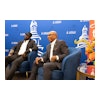Competing for Credit: Republican Watts Seeks HBCU InroadsWASHINGTON
Call it Black college fever. Some folks just don’t know what to make of the sudden interest that Rep. Julius Caesar Watts,
R-Okla., has in aiding
minority-serving institutions. Assembling a gathering of Black college officials to meet with congressional Republicans and standing by Texas Gov. George W. Bush as he unveiled a promise of major funding for minority-serving institutions, Watts has recently been linked with Black concerns on postsecondary issues in ways that his name has not been typically associated.
Of course, the former University of Oklahoma quarterback says he has always championed issues of access and equity for Black students and Black institutions. As he sees it, he just doesn’t always get the credit.
“The reward of a job well done is to have done it,” Watts told Black Issues, explaining why some people expressed shock at his most recent efforts. “I don’t do these things for people to toot my horn.”
The only Black Republican in Congress, Watts drew sharp-tongued criticism from the Congressional Black Caucus — of which he is not a member — for his June summit that brought together historically Black college and university leaders but excluded Dem-ocrats.
But Watts contends that if the Caucus and other Democrats were so concerned about Black colleges, not only would they have convened their own summit, they also would have increased federal support for programs crucial to Black college students while they had
control of Congress.
“Why didn’t they do it? They could have voted TRIO and Pell grants through the roof in 1990 and ’94,” says Watts, who this year is hoping to hold onto his House seat in a race against Democrat Larry Paul Weatherford, Reform Party member Susan Gail Ducey and Libertarian Keith B. Johnson.
As for what Black colleges and students of color have gained thanks to Republican leadership in the 106th Congress, Watts cites:
n $45 million for HBCU graduate schools, $5 million more than President Clinton’s request;
n The Fiscal Year 2001 Educational Appropriations bill, with $185 million for strengthening HBCUs, $36 million more than funding for fiscal year 2000 and $16 million more than the President’s request;
n Extending the date for eliminating HBCUs from federal financial aid programs due to high default rates from July 1, 2002, to July 1, 2004; and
n Recent passage of the Labor, Health and Human Services appropriations bill, H.R. 4577, which featured a 28 percent increase in federal aid to HBCUs over last year.
For their part, Black college leaders have taken Watts’ and his fellow Republicans’ attempts to woo them in stride. While making no promises about Election Day, Black college CEOs flocked to Watts’ Republican HBCU summit like it was the Second Coming.
“I hadn’t seen so many of my peers gathered in one place like that in a long time,” says Dr. Ernest Holloway, president of Langston University in Langston, Okla. “I think that’s because most of us realized that this was an opportunity — a forum where they could learn more about us and we could learn more about them.”
Officials from Watts’ office say more than 70 presidents and other high-ranking administrators attended the summit, which was followed by the announcement of a 14-member task force to study concerns raised at the forum.
Meanwhile Watts — seen by some as a Black who threatens to sway a large bloc of Democratic voters to the GOP — has been vociferously campaigning for Bush. A rising star in the Republican Party, Watts credits the presidential contender for making remarkable strides with respect to education in Texas. He says that Bush has dramatically increased teachers’ salaries in the Lone Star State and has raised the bar on educational standards and accountability.
“Those things matter to under-served communities,” Watts says. “If the educational system isn’t working, they tend to suffer first.”
Asked about his view on affirmative action, Watts coyly replies that “no child should be left behind.” When pressed, Watts says he is “not so sure about race and gender preferences,” adding that he prefers “a system based on need.”
To that, Rep. James E. Clyburn, D-S.C., retorts: “People have been segregated based on race, not need. Affirmative action as a needs-based solution is not affirmative action at all. This is not why Blacks were discriminated against — not because of their bank account, but because of race.”
But it is because of need that Black college leaders say they are willing to hear Watts out.
“As institutions, we need both parties to focus on our needs,” Holloway says. “Rep. Watts has brought that focus from the Republican side, and I appreciate that.”
© Copyright 2005 by DiverseEducation.com



















